

First |
Previous |
Next |
Last |
Book Index
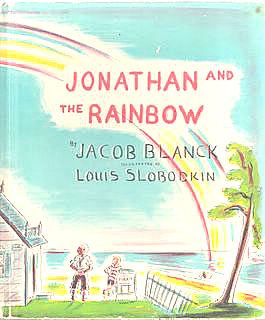
|
Author: Jacob Blanck Copyright Date: 1948 Publisher: Houghton Mifflin Pagination: 47 p. Dedication: for Rosamunde the Red |
Once there was a pirate who, having grown old, decided to retire and spend his days in peace. His name was
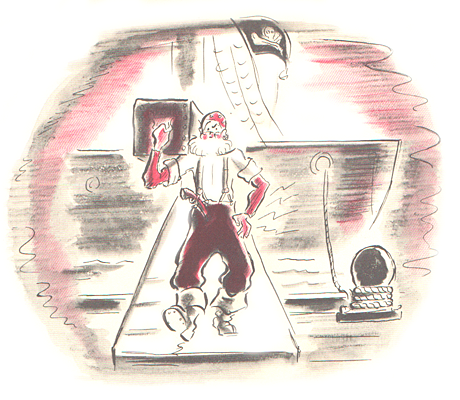 Captain Forthright Jones and he had been one of the most famous of all the pirates who sailed the Spanish Main. But being no longer young,
and afflicted with a rheumatism that made walking on a rolling deck uncomfortable, he retired to land.
Captain Forthright Jones and he had been one of the most famous of all the pirates who sailed the Spanish Main. But being no longer young,
and afflicted with a rheumatism that made walking on a rolling deck uncomfortable, he retired to land.Captain Jones built a little cottage on the edge of Long Island Sound where he could watch the ships go sailing up and down. It was just big enough for him and he painted it a delicate shade of creamy white while the shutters and door were painted a brilliant blue. The little red brick chimney that thrust itself up from the blue shingled roof was always a welcome sight to sailors at sea. On sunny days Captain Jones would sit in front of his cottage and watch the waves sparkle in the sun. They  reminded him of the treasure he used to carry on his faithful old ship, The Jolly Roger. On such days he was happy as any retired pirate
could be. But when the sun was behind the clouds Captain Jones would become sad and grumpy and wish that he could sail back to the South
Seas again. On such days he would grow very, very tired of his own company because, if the truth were known, the Captain was a very, very
lonely old pirate indeed.
reminded him of the treasure he used to carry on his faithful old ship, The Jolly Roger. On such days he was happy as any retired pirate
could be. But when the sun was behind the clouds Captain Jones would become sad and grumpy and wish that he could sail back to the South
Seas again. On such days he would grow very, very tired of his own company because, if the truth were known, the Captain was a very, very
lonely old pirate indeed.Now, the reason for his loneliness was simple enough but he did not know that. He thought it strange that no one from the village ever called on him or invited him in for a chat or for a sociable dish of tea. He didn’t realize that the sign on his front gate frightened his neighbors. What, you may ask, could there possibly be on a sign that would frighten a man’s neighbors? Here is the answer. The sign reads: |
|
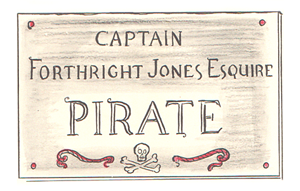 |
|
|
If Captain Jones hadn’t put that sign on his gate, his neighbors would have loved him in no time; and, perhaps,
might even have made him mayor. But no one came to visit him and since no one came, no one could tell him that the sign frightened the people
in the village. So Captain Jones was lonely and the villagers kept on being frightened. But there was one person who wasn’t afraid: a small boy named Jonathan. |
|
He had learned his alphabet but was not
yet able to read, so the sign couldn’t frighten him. If he could have read it, the sign wouldn’t have frightened him anyway because his father
had taught him never to be afraid. So Jonathan was brave as can be. 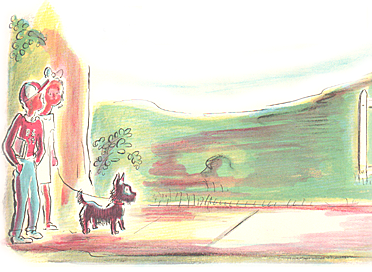 |
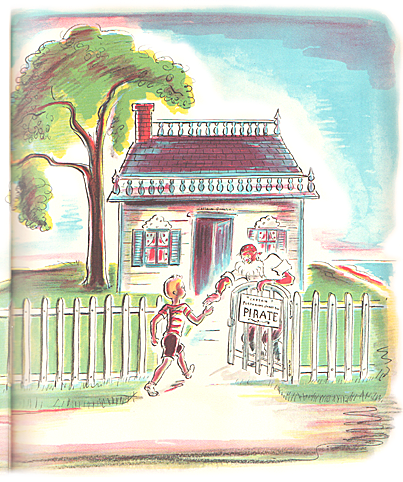 |
| Jonathan and the Captain became good friends. On bright days Jonathan would hurry over to the seaside cottage and he always found the Captain waiting | |
|
for him. Sometimes the Captain would tell him stories of Blackguard Flint and his terrible crew, or stories of the
Admiral of the Ocean Sea. But mostly he would tell Jonathan stories of the good old days when piracy was a gentleman’s profession and The Jolly Roger
was the swiftest and most wonderful ship afloat. And sometimes Captain Jones would show Jonathan how to reef a bowline or how to tie a sheepshank knot. |
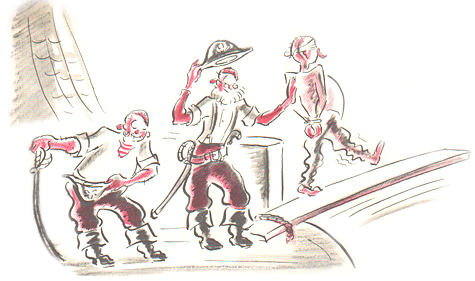 |
|
One day while Jonathan and the Captain were enjoying the sun in front of the cottage, Captain Jones looked up and said: “Jonathan, my lad, it looks like rain.” “Oh, no, Captain Jones. It can’t rain.” “And why not, may I ask?” asked the Captain. “Why, it can’t rain. I heard the radio report this morning and it said we were going to have fair southwesterly winds and blue skies. And the weather-man is never wrong.” 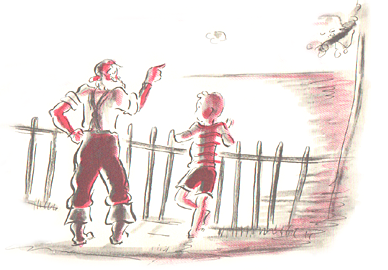 The Captain snorted. “Hmph! Weather Bureau stuff! Look, Jonathan, my lad, over yonder in the nor’east is a cloud no bigger
than a small man’s fist, and my rheumatism tells me that we’ll have a blow within a matter of minutes.”
The Captain snorted. “Hmph! Weather Bureau stuff! Look, Jonathan, my lad, over yonder in the nor’east is a cloud no bigger
than a small man’s fist, and my rheumatism tells me that we’ll have a blow within a matter of minutes.”Jonathan shook his head doubtfully. “Aye, Jonathan, my rheumatism is more accurate by far than all the weather experts. Wait and see.” And no sooner had Captain Jones spoken than the wind shifted and came blowing in from the northeast. The sky darkened and almost before the Captain and Jonathan could hurry indoors the rain came pouring down. The wind and the rain beat at the windows and pounded the shingles on the roof. “Now,” shouted the Captain above the roar of the wind, “what do you think of Captain Forthright Jones, Esquire, as a weather prophet?” It was warm and comfortable in the cottage. The Captain took down his wheezy old accordion and played and sang some of the old chanties. Here is one of Jonathan’s favorites: 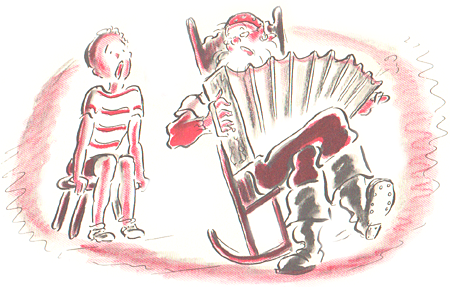
Then Captain Jones prepared a snack of toast and strawberry jam and milk. He threw a chunk of driftwood into the fireplace, and when the fire was roaring up the chimney he told Jonathan stories of pirates and shipwrecks. Soon the storm blew out to sea, the sun came out again and the air was sparkling bright. Jonathan helped wash the saucers and glasses, and while the Captain opened the windows to let fresh sea-air come billowing in, Jonathan carried the chairs outdoors. When he got to the front of the cottage he saw something that astonished him: a rainbow arching over the sea. He was breathless with surprise and delight. Then he caught his breath and cried: “Captain! Captain Jones! Look, sir, a rainbow! Come quickly!” Captain Jones hurried out just as fast as he could, untying his apron as he came. “Well—,” said the Captain, “well—.” And because he, too, was overcome by the beauty of the rainbow, he said “Well—,” just once more. Finally Jonathan spoke. “Captain Jones, sir, is it true what they say about rainbows?”
|
||
|
|||||||||||
First |
Previous |
Next |
Last |
Book Index